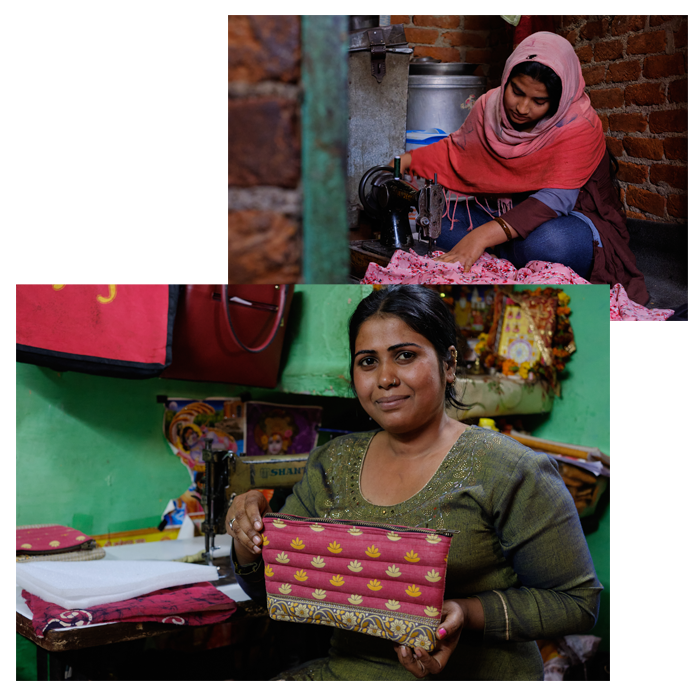“People talk about big brands, what about our representation? Nobody recognises us and our work.”
Home-based workers are both self-employed and work for contractors on a piece-rate basis who work out of their homes but without any recognition and social security entitlements.

Home-based Workers
These workers are both self-employed and work for contractors on a piece-rate basis who work out of their homes but without any recognition and social security entitlements. In 1999, SEWA in Delhi identified a large number of home-based workers in the eastern part of Delhi engaged in bindi, bangle, bedsheet making and embroidery. Most of them migrated from parts of Uttar Pradesh and Madhya Pradesh in search of better livelihood opportunities. These home based workers were part of the big international readymade garments supply chain and were working on the terms of contractors.
Role of SEWA in Delhi
- SEWA established a ground breaking and scalable embroidery center which was also approved by Ethical Trading Initiative (ETI), which exists to identify and promote good practices in the implementation of company codes of conduct on labour standards. These centers linked garment companies directly with workers, eliminating exploitation by middlemen.
- With layers of middle men removed, SEWA are able to pass on these savings to the home-workers so they get higher piece rates for embroidering, embellishing or sewing garments. Gradually, SEWA established six centers operational in Delhi Sunder Nagri, Nand Nagari, Mustafabad, Mulla Colony, Rajiv Nagri and Ashok Nagar. Gradually, SEWA established six centers operational in Delhi Sunder Nagri, Nand Nagari, Mustafabad, Mulla Colony, Rajiv Nagri and Ashok Nagar.
Highlights of work by SEWA in Delhi
Linked 700 members directly to international garment suppliers and exporters.
Provided 300 members with regular work and decent income to supplement their family income.
Established linkages with government welfare schemes and health programs.
Provided vocational training through SEWA Youth Resource Center.
Direct support to state-level trade committee of home-based workers to conduct meetings every quarter.
SEWA in Delhi established SEWA Ruaab, a women’s owned producer enterprise.
Engagement of Ruaab SEWA women workers in legal awareness, technical skill development, and general marketing skill building in order to their capacity and resist exploitation. One such umbrella programme is the Hidden Homeworkers Programme.
Microfinance services of savings and credit triggered by the needs of Ruaab SEWA women established the Mahila SEWA Cooperative Thrift and Credit Society, also known as Delhi Credit Cooperative (DCC).
